Acer Aspire S7 Ultrabook: Acer’s Best Foot Forward
by Jarred Walton on January 7, 2013 4:30 AM EST- Posted in
- Laptops
- Acer
- Intel
- Ivy Bridge
- Aspire S7
- Ultraportable
- Ultrabook
Performance, Now with Windows 8
As this is the first laptop we're testing with Windows 8, we've had to go back and revamp our testing suite a little bit. For example, PCMark Vantage simply refuses to complete under Windows 8 on the S7, and the same goes for a few other old Futuremark programs; we'll add the next versions of PCMark and 3DMark when they become available, but PCMark 7 and 3DMark 06 and 11 are the only Futuremark tests we’ll be running for now.
We're also taking the opportunity to upgrade several of our older benchmarks; we've been using the x264 HD 2.x encoding benchmark for a while now, but we're going to upgrade to 5.x with Windows 8—which, incidentally, takes about 10x as long to run. We will also be adding WinZip as a benchmark, with OpenCL acceleration enabled. Another benchmark we're adding with the S7 is TouchXPRT (currently in preview release) and a similar test from the same company called WebXPRT 2013. Anand has used both on the Clover Trail/Surface reviews, so it will be interesting to see what Ivy Bridge looks like by comparison. I’m not going to spend a lot of time on the tablet comparisons in terms of performance, but I also ran most of the current suite of tablet benchmarks, which we’ll look at on the next page (SunSpider, Kraken, etc.)
For the time being, that should be sufficient, but we'll be certain to add other benchmarks and tests to the mix as we deem them appropriate, so if you have any recommendations or suggestions we're happy to hear them. We will begin as usual with PCMark 7, which gives us at least some inkling of overall performance, along with our usual suite of CPU-centric tests. We shouldn't see any major surprises here, as the Acer S7 has the same components as many other Ultrabooks that we've tested. Here’s the quick overview of the test components for the various laptops:
| Laptop Configuration Overview | ||||
| Laptop | CPU | Graphics | Storage | Battery |
| Acer Aspire S3-951-6432 | Intel i7-2637M | HD3000 | 256GB SSD | 38Wh |
| Acer Aspire S5-391-9860 | Intel i7-3517U | HD4000 | 2x128GB SSD | 35Wh |
| Acer Aspire S7-391-9886 | Intel i7-3517U | HD4000 | 2x128GB SSD | 35Wh |
| Apple MacBook Air 13 (Mid-2012) | Intel i5-3427U | HD4000 | 256GB SSD | 50Wh |
| ASUS Zenbook Prime UX31A-DB71 | Intel i7-3517U | HD4000 | 256GB SSD | 50Wh |
| Dell XPS 13 | Intel i7-2637M | HD3000 | 256GB SSD | 47Wh |
| HP Envy 14 Spectre | Intel i7-3667U | HD4000 | 2x128GB SSDs | 56Wh |
| HP Folio 13 | Intel i5-2467M | HD3000 | 128GB SSD | 60Wh |
| Intel IVB Ultrabook Prototype | Intel i5-3427U | HD4000 | 240GB SSD | 47Wh |
| Toshiba Satellite U845-S406 | Intel i5-3317U | HD4000 | 500+32GB Hybrid | 54Wh |
| Toshiba Satellite U845W-S410 | Intel i5-3317U | HD4000 | 500+32GB Hybrid | 54Wh |
Before we get to the actual tests, I want to make note of the fact that this is bar none the fastest booting laptop or PC that I've ever used! Just how fast does the laptop boot up? How about under 10 seconds? Granted, much of that is probably Windows 8 (Dell’s XPS 12 posts similar boot times), but it's still impressive nonetheless. Shutdown, hibernate, and resume are all equally fast, though if all you do is put the laptop to sleep and wake it up you won’t need to worry too much about such things.
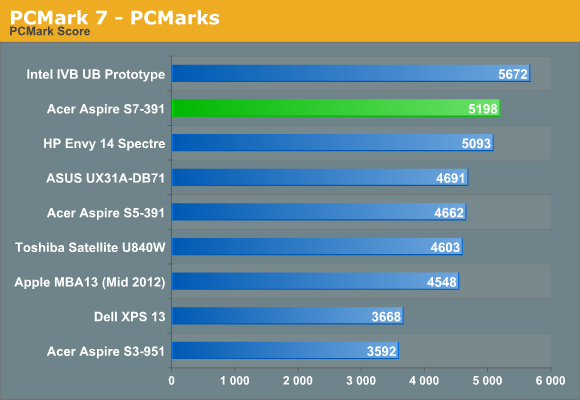
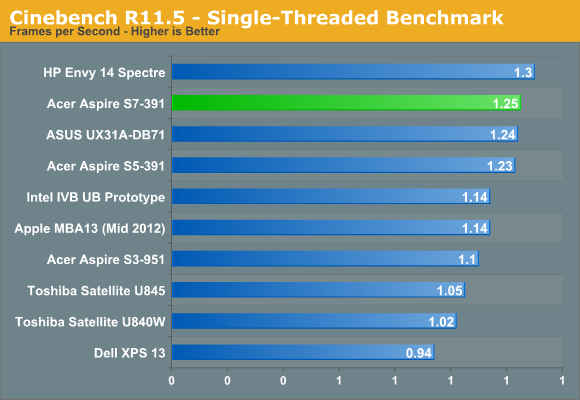
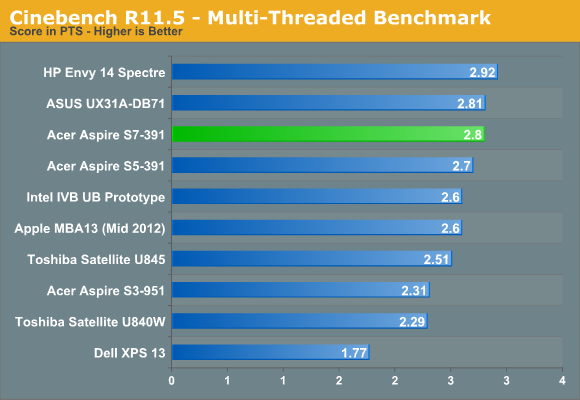
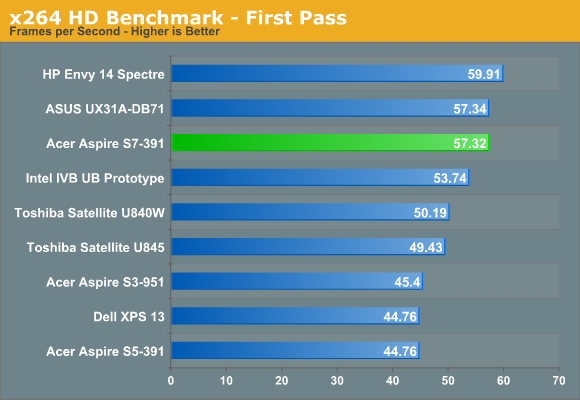
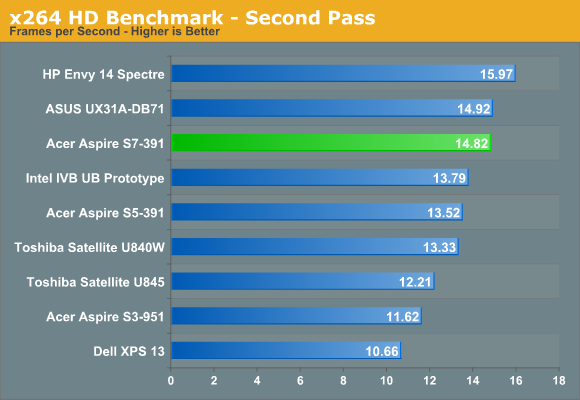
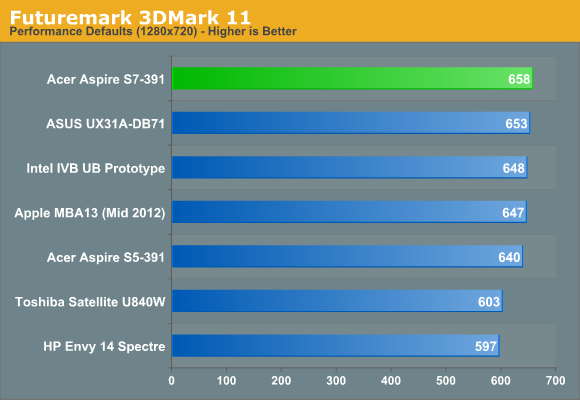
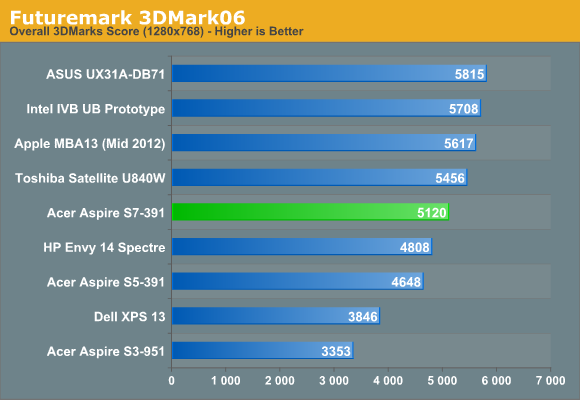
Our benchmarks start with an interesting piece of information: the Ivy Bridge prototype that Intel sent us still manages to hold onto the top spot in the overall PCMark 7 score, thanks in particular to its performance in the Creativity, Entertainment, and Computation suites—and this despite the fact that it’s equipped with a Core i5-3427U compared to the i7-3517U in other systems. (We only show the overall score above, but you can see the full set of PCMark7 results in Mobile Bench.)
It’s not quite clear what’s holding the S7 back, but while it has the top Storage score, it falls well short in the Lightweight and Productivity suites. Possibly Windows 8 is partly to blame, or more likely the combination of components (and possibly that RAID 0 storage setup) are coming into play. Then again, PCMark7 is prone to odd variations, and depending on the drivers (Quick Sync) and storage you can see large differences between what should otherwise be similar laptops—just look at how the earlier Aspire S5 with Windows 7 stacks up to the new Aspire S7!
The other benchmark charts are more in line with what we’d expect. HP’s Envy 14 Spectre snags the top spot for all of the CPU benchmarks, which makes sense considering it has the highest clocked i7-3667U processor of the bunch. The Acer S7 and ASUS UX31A are tied, which goes with their identical CPUs. 3DMark06 does show the Acer falling behind, but here again I’d look more at Windows 8 than anything specific to the S7. The march of time and/or drivers also shows a nice progression when looking at the S3, S5, and S7










53 Comments
View All Comments
mforce - Monday, January 7, 2013 - link
I find it seriously difficult to justify spending more than 500$ on a laptop. I don't make that much but even if I did ... I'm not really sure what justifies and over 1000 $ price for a laptop, it's just way too much.And the fact that it's an Acer doesn't help things much, let's face it, Acer doesn't really have a premium brand and it's not Apple. If I'll want to sell it right after I buy it I probably won't get more than 1000$ for it.
Besides even cheapo laptops often last quite a long time, I have an Acer I paid 400$ for and it's still running just fine 4 years later.
Romberry - Monday, January 7, 2013 - link
It's a conundrum eh? People like to complain that Windows-based notebooks aren't up to the build quality of Apple's MacBooks that go for well over a grand, but when confronted with a Windows-based notebook that rivals (or meets and in some cases exceeds) the build quality of Apple's MacBooks, the same crowd that bemoans the quality of the sub-500 dollar Windows machines balks.You can have cheap and (hopefully) acceptable, or you can have quality and the price that comes with it. If you're a 500 dollar and under laptop kind of person, then obviously this product is not for you.
Personally? I tend to agree that paying well over a grand for a laptop is very hard to justify for most people. I wouldn't do it. Example? I'm typing this post on an old (five years plus) Dell Inspiron e1505 running a Core Duo (not Core 2) processor , 1680x1050 display, 4 gigs of RAM and a 500 gig Hitachi hard drive with 32 bit Vista Ultimate. Bought two of these in May of 2007 for about 500 dollars a whack new from Dell on special, one for me and one for my daughter. Does everything I need it to do and is comfortable like an old shoe.
I have a Dell Latitude 6400 in the next room (Core 2 Duo P9600 at 2.66 GHz, 8 gigs RAM, 1920x1200 display, 128 gig Samsung 470 SSD primary drive, 500 gig WD Scorpio Black in the expansion bay in place of the optiical drive.) that I paid all of 400 dollars for off lease two years ago. (Added the SSD, upgraded the RAM and installed Win 7 x64.) It mostly sits unused because of the old shoe factor with the Inspiron.
Neither are sleek or easily portable, but they are functional, stable and reasonably fast for what I do with 'em.
I'm not sure just how big a market there is really for high end laptops. Apple sells a lot of MacBooks in terms of units, but in terms of overall market share...not that much. MacBooks are a niche. I think Winbooks built to these high standards are likely to be niche products as well, garnering about the same 3-5 percent share of the overall market as MacBooks. (Of course for many people I think those Apple MacBooks are as much a fashion accessory as they are a PC. Winbooks will likely never have that sort of purposeful snob appeal cachet. Then again, not everyone wants to be a snob.)
blue_urban_sky - Monday, January 7, 2013 - link
I agree with your statement about PC laptops not being able to win as they either feel cheap because they are or are too expensive. I would however like to draw some comparisonsGalaxy S3 ~ £400
iPad4 3g 64gb ~ £650
so £1000 for an ultra-book is not out of place, Don't get me wrong they are all expensive and products like the nexus range start to chalenge these premium prices.
Just so my bias is clear I own a S3, nexus 7 and brought my wife a yoga 13 for xmas as she is a dev and commutes with her laptop on the train so I wanted to find a nice light one. She loves it so money well spent.
mforce - Monday, January 7, 2013 - link
Sure but Nexus devices are cheaper and still quite good. And besides smartphones and tablets are all the rage these days , I don't think such a device can match that.Death666Angel - Monday, January 7, 2013 - link
200€ for a Nexus 7, 300-350€ for a Nexus 4, 400€ for a Nexus 10 and ~150-200€ for about any dual/quad A9 Chinese tablet and smartphone with specs similar to the current high end crop (800p, 1080p, 1200p ips screen @ tablet, 540p or 720p @ smartphone, 4-32GB NAND, 7.4Wh/25Wh batteries etc.). So I would argue that the prices you mention are just as overpriced.blue_urban_sky - Monday, January 7, 2013 - link
Although there is an argument that the high end products profits from manufacturers like Samsung, LG and Apple (tho indirectly) go toward the R&D of next gen hardware. I cannot see those same chinese manufacturers coming out with a flexible display until the tech is matured by one of the larger players at significant cost.Overpriced is strong term, as mentioned in the article the PC community have enjoyed a race to the bottom with little thought to anything other than Power/Price. I for one am glad that companies are looking to push toward aesthetics. If a Bugatti Veyron costs £2M, Aston Martin Vanquish costs £180k and Suzuki Alto costs £6k which one is better to get a pint of milk from the store in? and would you really like to live in a world where there is no "Wow"?
Death666Angel - Monday, January 7, 2013 - link
Then disregard the Chinese offerings, but a Nexus 7 at 200/250€, a Nexus 4 at 300/350€ and a Nexus 10 at 400€ still significantly undercut his listed devices while offering comparable to arguably better specs.As for the rest of your comment that car analogy has nothing to do with my comment and you are reading things into my comment that are clearly of your own mind.
blue_urban_sky - Tuesday, January 8, 2013 - link
The car comparison was just to illustrate that overpriced is highly subjective. The initial prices included the statement that the nexus range were challenging the sector, although google is not interested in profiting off these devices themselves.(http://crave.cnet.co.uk/mobiles/google-nexus-7-sel...
I would think that these ultrabooks are not big earners due to high development costs and low unit sales, So rather than overpriced I think that maybe they are just expensive.
mforce - Monday, January 7, 2013 - link
I was just saying that Acer can't expect people to pay as much for their brand as they do for Apple or Sony ( if you want Windows laptops ) and that's the reality. Given the choice almost anyone would choose an Apple or Sony product ... sure it may not be better and I know that but this is how it works.Also I find the touchscreen on a laptop a bit useless maybe, I don't find myself using it much. I'd rather have a mouse :D
blue_urban_sky - Monday, January 7, 2013 - link
Poor old Acer, If they are trying to up there game good on them I think they know it will be an uphill battle winning consumers over and maybe they have made a product that is very well made with quality parts for that very reason.... Maybe.